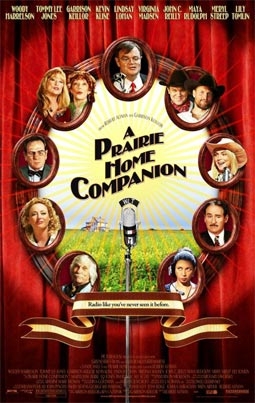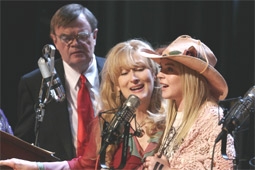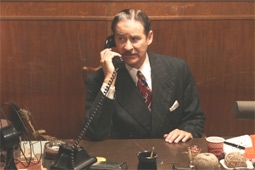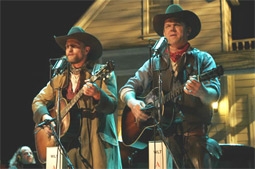



On-screen and off, there was never a moment of silence during the showing of A Prairie Home Companion. Giggles and laughter constantly echoed off the movie theater walls, produced by the movie-goers who squeezed into the fully sold-out auditorium. The movie also never had a quiet moment, for the constant chatter, dialogue, and random break outs of song kept the movie alive, despite its subtle yet ever-present themes of death, destruction, and loss. A Prairie Home Companion, directed by Robert Altman with a screenplay by the witty and eloquent Garrison Keillor, did not leave me preoccupied by death and suicide like Lola Johnson, played by a blonde Lindsay Lohan. Rather, I left satisfied and content, happy for the characters who truly loved music, song, and their radio show. Though I only listened to the actual radio show, A Prairie Home Companion, currently on the air for NPR (National Public Radio), when my parents refused to turn to a top-40 radio station, I left the movie with a new respect for this unique, eclectic show.

The movie takes place in St. Paul, Minnesota and begins with smooth jazz, the theme music for the not-so-smooth Guy Noir (Kevin Kline), A Prairie Home Companion's private eye and "vice president of security" as he calls himself. Though he tries so hard to be as slick as his hair, Noir often finds his fingers stuck in desk drawers and cabinets as he clumsily walks around backstage. Noir is on his way to the Fitzgerald, the home of A Prairie Home Companion's weekly show. He tells us the news of the impending destruction of the Fitzgerald into a parking lot and says that the show has run since "Jesus was in the third grade." Humor like this is incorporated throughout the incessant, and at times, exhausting dialogue.

The cameras never veer far from the Fitzgerald, the set of the radio show. All action (or lack of action) takes place on the night of Garrison Keillor's final performance of A Prairie Home Companion. Called GK by his friends, he wanders around the set full of stories that purposefully seem never-ending when begun. The backstage manager, Molly, played by Saturday Night Live's Maya Rudolph, almost has several nervous breakdowns because of his lack of concern for show time. She conquers her agita by chomping incessantly on a stick of gum.

Meryl Streep and Lily Tomlin play Yolanda and Rhonda Johnson, the artsy, spacey, and loveable sisters who have their own singing act. Lindsay Lohan, certainly not the center of attention in the film, plays Yolanda's (Meryl Streep's) gloomy daughter. Hoping for a minute of airtime, she explains to her mother that her poems are about death and suicide. Streep replies with a pleasant, "Oh!" and doesn't seem to mind one bit. The sisters are not the only characters who shine; in fact, all of the actors effortlessly become the eccentric radio show stars who live for what they do.

Nostalgia surrounds everyone during this final performance, and the only one who doesn't seem to mind the show's ending is Garrison Keillor. He waltzes through with no stress or concern, and comfortably improvises when Molly (Maya Rudolph) misplaces his script. This was one of the funniest moments of the movie, for Garrison Keillor concocts a story about one of A Prairie Home Companion's sponsors, duct tape, while awaiting the next page of the script. Several people join in, helping GK with his story. Teamwork wins the day as man-made sound effects illustrate the wild story involving orangutans and helicopters.
A woman in white, played by Virginia Madsen, strangely and mysteriously drifts around the stage. We learn she is an angel of death who died while driving in her car, listening on the radio to A Prairie Home Companion. She takes one of the older members of the show, Chuck, played by LQ Jones, with her back to heaven. At the end of the movie she leads the Axeman, played by Tommy Lee Jones, to death. The Axeman sees A Prairie Home Companion as a relic, primitive enough for a museum exhibit. He is the one responsible for the destruction of the Fitzgerald, but his death does not stop the demolition trucks from tearing down the old, beloved stage.
I enjoyed this movie for its distinctiveness and its embrace of the genuine; nothing seemed over-dramatic or false. All the radio show stars eased onto the stage and performed very naturally. Their main concern was not just pleasing the radio audience or the audience in the Fitzgerald, their concerns were for each other and for the music. I found their enthusiasm pleasantly infectious, and I enjoyed being a part of their last show. A
A Prairie Home Companion
Rated PG-13 for risque humor. Runtime 105 min. Theatrical release 6/9/2006.
